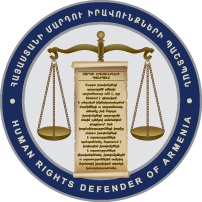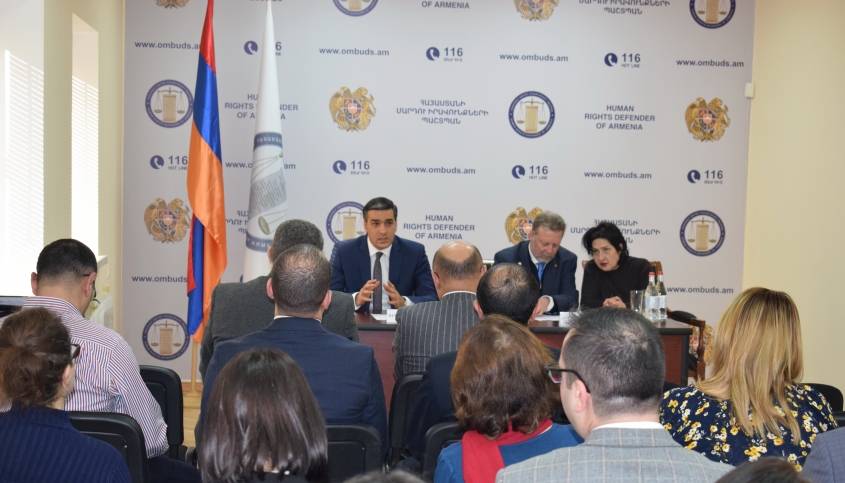On December 29 2017, the Human Rights Defender’s ad hoc report on “Securing the rights of refugees and asylum seekers in the Republic of Armenia” was presented at the Human Rights Defender’s Office. The report was prepared in the framework of “Enhancing the capacity of Human Rights Defender’s Office to monitor the situation of refugee and asylum-seekers in Armenia” joint project of the Defender’s Office and the Representation of the United Nations High Commissioner for Refugees in Armenia (UNHCR).
The Human Rights Defender, Mr. Arman Tatoyan, UNHCR Representative in Armenia Mr. Christoph Bierwirth, as well as representatives of State Migration Service of the RA Ministry of Territorial Administration and Development, Border Guard Troops under National Security Service of RA, the Office of Public Defender, RA School of Advocates and other relevant state bodies, as well as representatives of various NGOs and international organizations attended the event. During the meeting importance of joint efforts with State Migration Service, Border Guard Troops, Penitentiary Service, as well as other relevant bodies and NGOs in the framework of preparing the report was underlined.
In his opening remarks, the RA Human Rights Defender highlighted the importance of ensuring the human rights of the refugees and asylum-seekers in Armenia. When presenting the main directions of the report, Mr. Tatoyan underlined the importance of careful analysis of the relevant legislation, the situation on ensuring the rights of refugees and asylum-seekers in special institutions, as well as adoption of decisions of the State Migration Service.
In his welcoming remarks, Mr. Christoph Bierwirth, UNHCR Representative in Armenia emphasized the highest respect the institution of asylum enjoys in the Armenian public and within the authorities, given the collective memory of thousands of Armenian’s having found protection as refugees in Russia, Europe, Arabian and American countries and acknowledged Armenia’s present important role by hosting about 15,000 persons displaced due to the conflict in Syria. He explained that refugee protection is a form of human rights protection, particularly relevant when the authorities of the country of origin are unable or unwilling to offer such. He therefore welcomed the engagement of the Human Rights Defender of the Republic of Armenia in looking at the issue of refugee protection, including by having prepared and presenting the "Ad-hoc Public Report".
Mr. Bierwirth acknowledged the significant progress which has been made in the recent years, including by way of issuing improved legislation, further training and capacitating the staff of the State Migration Service and other relevant authorities, strengthening the legal counselling system, enhanced engagement of the judiciary and most recently by the provision of a modern office to the State Migration Service. While pointing to some remaining challenges, including the need to strengthen and improve the reception capacities and to further improve the modalities of addressing legitimate security concerns in a way fully compatible with international refugee and human rights law, he noted that the report is not about naming and shaming, but shall allow a well-informed, professional discussion how remaining challenges can be addressed and the refugee protection system in Armenia be further improved. He therefore invited all stakeholders, Government officials, members of the judiciary, representatives of international organizations and NGOs to carefully study the report and its recommendations.
RA Human Rights Defender’s ad hoc report on “Securing the rights of refugees and asylum seekers in the Republic of Armenia” has been published both in Armenian and English languages.
Within the project the leaflets on the rights and obligations of refugees, as well as on procedure of discussing the application by the Defender has been published. Except Armenian, those leaflets have been printed in languages widely used among refugees: English, Russian, French, Spanish, Arabic and Persian․



